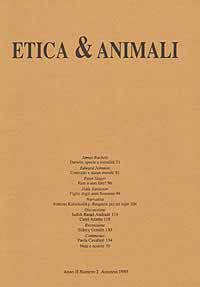 Cover of the first issue | |
| Discipline | Animal ethics |
|---|---|
| Language | English |
| Edited by | Paola Cavalieri |
| Publication details | |
| History | 1988–1998 |
| Publisher | Animus (Italy) |
| Frequency | Quarterly |
| Standard abbreviations | |
| ISO 4 | Etica Anim. |
| Indexing | |
| OCLC no. | 38160858 |
Etica & Animali ("Ethics & Animals") was an academic journal of philosophy published quarterly from 1988 to 1998, covering animal ethics. It was established and edited by the Italian philosopher Paola Cavalieri. [1]